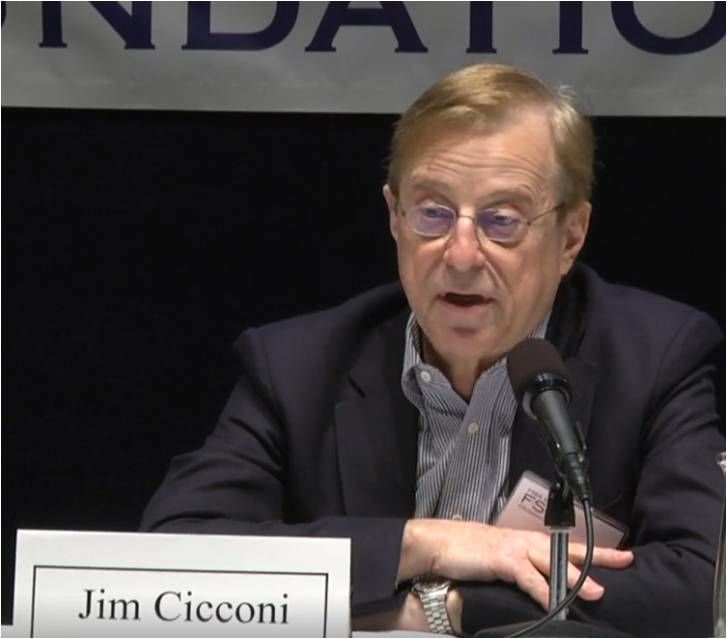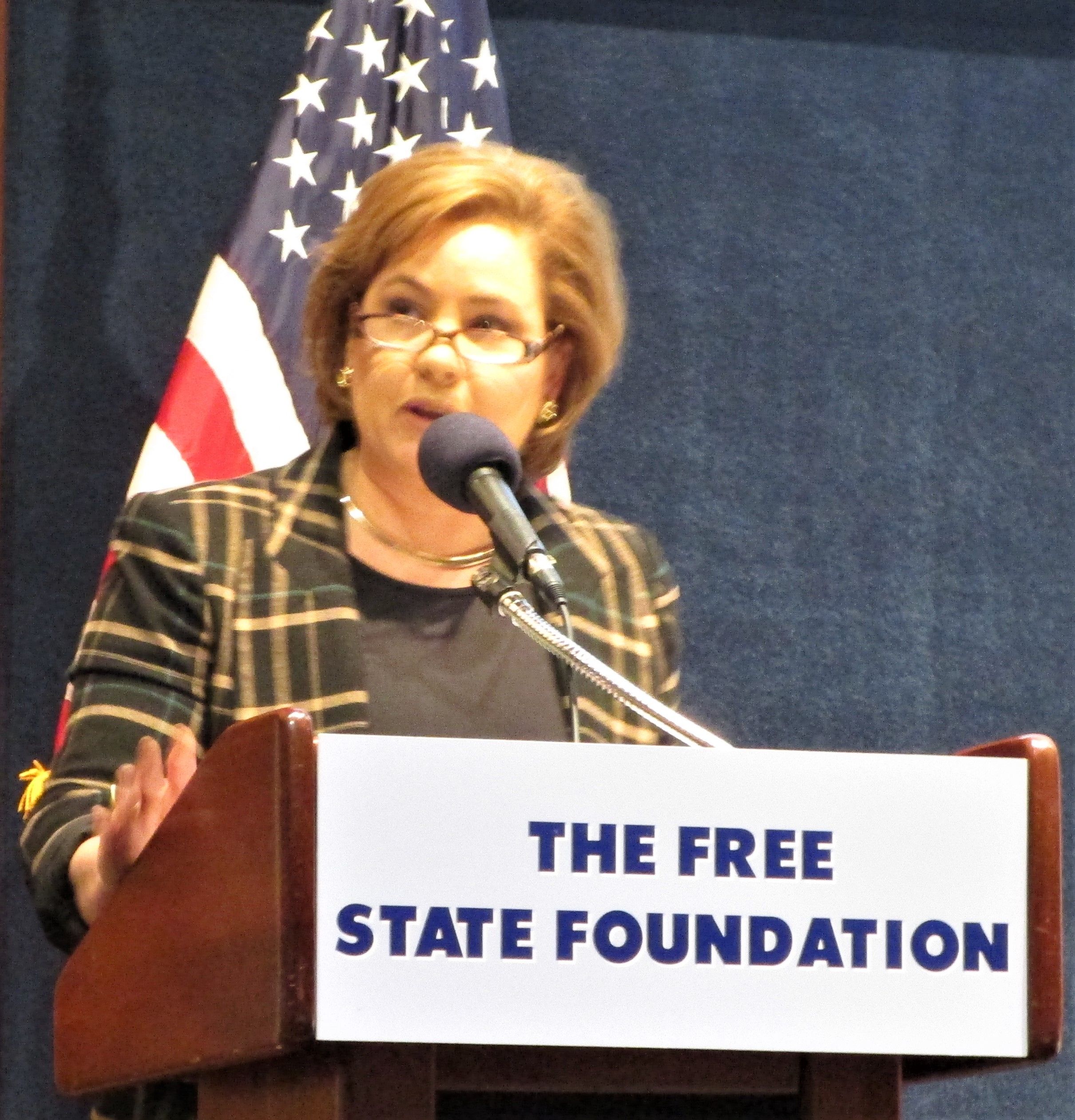AT&T Questions Broadcasters' Use of TV Spectrum

The smarter way to stay on top of broadcasting and cable industry. Sign up below
You are now subscribed
Your newsletter sign-up was successful
Policymakers "need to take a fresh look at existing allocations of spectrum, including the allocation of spectrum to broadcasters" to determine if "that spectrum is still needed by the broadcast industry or if it is better used in other areas," said Jim Ciconni, senior executive VP of AT&T at a Washington think tank event. Criticizing 50-year-old government policies, Ciconni also pushed for re-examination of the spectrum reserve that is hoarded by federal agencies, especially the Defense Department, that could be reassigned or shared for commercial purposes.
Claiming that the "government put its thumb on the scale" when it gave TV operators so much spectrum, Ciconni argued that, "It's time to take a fresh look ... at the geographic monopoly bestowed by the government" to broadcasters, whom, he charged, are not fulfilling the obligations of their licenses - especially since they rely on MVPDs for much of their distribution and revenue.
Ciconni also said its time to reexamine the policy preferences given to digital platforms when they emerged in the 1990s, when the internet was nascent. He said some of those policies "make little sense today."
Cicconi eased into his assaults on broadcasting and digital behemoths by questioning the large spectrum reserve held by the federal government, especially by the Defense Department.
"The issue that cries out for Congressional action is the immense amount of spectrum still held by the Federal government," citing the value of "sharing Defense Department spectrum if we're to move forward," he said.
AT&T's D.C. lobbyist, who acknowledged he holds the job on an "interim" basis (called back six months ago after a two-year retirement), focused on broadcasters' "ineffective" use of airwaves and the "unlevel playing field" at a time with growing demand for wireless spectrum.
"Stations are not owned by locals to the extent they were 50 years ago," he said, citing the "conglomerates and hedge funds" that now hold TV licenses. He claimed that TV stations do not fulfill "the social contract" that was part of their local license agreement. In particular (reflecting AT&T's ownership of the fading DirecTV service), Ciconni denounced the "constant blackouts and threats of blackouts ... [that] have ticked off customers, who are leaving broadcast for streaming services."
The smarter way to stay on top of broadcasting and cable industry. Sign up below
"The status quo is not sustainable," Ciconni said.
Ciconni waived off a question from Multichannel News about the potential impact of ATSC 3.0 ("NextGen TV"), which enables broadcasters to offer internet protocol wireless services, potentially in competition with telecom 5G ventures.
"I don't really know," Cicconi chuckled.
Unified Privacy Accord, Wireless Policies on Agenda Albeit Washington Priorities Uncertain
Ciconni's tirade was part of the centerpiece panel during the Free State Foundation's 12th annual Telecom Policy Conference in Washington on Tuesday, March 10. Reflecting the theme of the event ("Broadband Beyond 2020: Competition, Freedom, and Privacy"), the panel delved into an array of issues, supplementing points made by the program's keynoters from the White House, Department of Justice, Federal Trade Commission and Federal Communications Commission.
Related: DOJ's Rosen Signals Possible Action if Big Tech Proves 'Innovation' Threat
FTC commissioner Christine Wilson led the call for a single nationwide privacy policy rather than the evolving state-by-state privacy process that is emerging now that the California Consumer Privacy Act has gone into effect. Wilson cited studies showing that consumers don't understand how personal information is used, and acknowledged that "although I have great faith in markets, sometimes legislation is necessary" to assure that consumers are treated fairly.

"Government intervention through the form of privacy legislation may help consumers," she said, urging a "comprehensive privacy" law, and recommending that "the FTC ... should be the enforcement agency." She also suggested that the FTC "should have jurisdiction over non- profits and common carriers" that collect large amounts of personal data. Preemption is key to precluding a patchwork of state laws that will hinder businesses and data flows, Wilson said.
After endorsing continued use of the FCC's Restoring Internet Freedom Order, Wilson pointed out that the FTC is "actively strengthening its existing expertise in broadband and technology markets." She cited the newly created "technology enforcement division," whose jurisdiction includes internet policies and called the group "incredibly busy."
WiFi-6 vs. 5G, 5.9 GHz and Beyond, Despite Shifting Policy Landscape
During the conference's panel discussion on spectrum usage, the focus turned to licensed versus unlicensed allocations - and a total geek-fest evolved.
"If we don't have more spectrum, then WiFi in homes and offices will become a chokepoint," warned Mary Brown, senior director for technology and spectrum policy at Cisco. She said that more unlicensed spectrum is vital "to keep up with DOCSIS 3.1 and DOCSIS 4.0, which is on the drawing board."
"Unlicensed is part of our 5G future," she said, emphasizing that it is necessary because "our broadband speeds are increasing."
Brown added that "the point of opening up the 6 GHz band" is to capitalize on the "fixed inks that are already there."
The panel agreed that the evolution of WiFi 6 (the next generation of near-range wireless service) is part of the rollout of 5G systems.
James Assey, executive VP of NCTA - the Internet and Television Association, insisted that, "we need both [licensed and unlicensed spectrum]."
"We need a balanced spectrum policy that ... recognizes the tremendous value in unlicensed spectrum," he said. "Unlicensed has shown it can revolutionize how people use that band. ... We are going to need ...both sufficient spectrum for licensed users and to support unlicensed and gigabit WiFi ... [which] will serve as a backbone for future services."
As for the evolving FCC decision on use of the 5.9 GHz spectrum, Brown explained that the "5.9 band is a difficult problem." She cited the FCC proposal to continue to silo part of that spectrum for Intelligent Transportation Service.
"However, radio [can be] untidy," she said. "You'll need rules about adjacent channel use." Brown expects that the way in which the FCC "resolves that problem will be critically important." She cited the cable industry's views on preserving the bottom of that bandwidth for specific uses.
Assey pointed out that 5.9 GHz band has been "a vacant lot" for past 20 years, and he complimented FCC chairman Ajit Pai for beginning a probe into how to use it to create "a new gigabit channel."
While the technology lobbyists concurred on the range of policy issues ahead, they were less sanguine about resolutions in the current unsettled political environment. For example, when asked about the role of the Interdepartment Radio Advisory Committee (IRAC), the speakers diverted to a discussion about the status of its parent National Telecommunications and Information Administration, which has been led by a succession of "acting" officials.
Cicconi complained that the agency is "semi-dysfunctional," because "you don't have any degree of continuity ... [without] a Senate-confirmed position" heading the agency. Without such leadership, Cicconi said, "It's hard to make policy."
Brown supported the efforts of the agency, but added that,"without concensus, decisions don't get made." She also fretted that "lurching toward security policy ... is not a great way to proceed. I hope for better days ahead."
Other speakers at the FSF event included FCC chairman Ajit Pai, who appeared via a 10-minute video recording. He updated the group about the FCC's 5G, rural broadband and other developments. Robin Colwell, special assistant to the president for Technology, Telecom and Cybersecurity, read a prepared presentation about White House focus on rapid 5G deployment, mid-band spectrum availability and the Administration's goal to promote 5G security worldwide. FCC commissioner Michael O'Rielly and former commissioner Mignon Clyburn chatted about telehealth, rural broadband in a final on-stage conversation with FSF president Randolph May, foreshortened because FCC commissioner Brendan Carr could not join the group.
Contributor Gary Arlen is known for his insights into the convergence of media, telecom, content and technology. Gary was founder/editor/publisher of Interactivity Report, TeleServices Report and other influential newsletters; he was the longtime “curmudgeon” columnist for Multichannel News as well as a regular contributor to AdMap, Washington Technology and Telecommunications Reports. He writes regularly about trends and media/marketing for the Consumer Technology Association's i3 magazine plus several blogs. Gary has taught media-focused courses on the adjunct faculties at George Mason University and American University and has guest-lectured at MIT, Harvard, UCLA, University of Southern California and Northwestern University and at countless media, marketing and technology industry events. As President of Arlen Communications LLC, he has provided analyses about the development of applications and services for entertainment, marketing and e-commerce.

